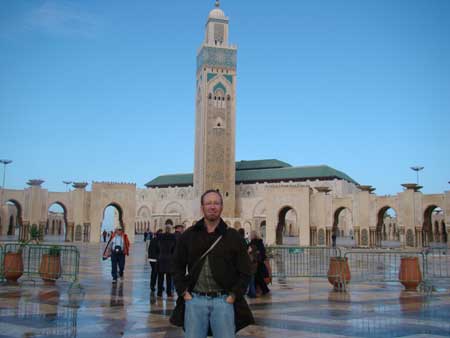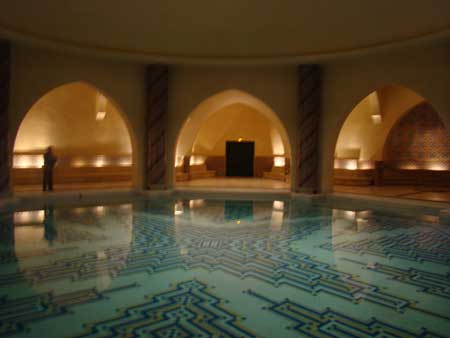A Prayer for Moderation: Islam in Morocco

Every religion has its share of extremists, but they are fortunately, and for the moment, the exception to the rule. And to its profound credit, one way Morocco really impressed me was with its example of moderate Islam. I can't claim to be an expert on the subject, although I did live from 93 to 94 in Indonesia, another moderate Muslim country (neither of which, unfortunately, is free from extremism, notably the Kuta Beach bombing of October 2002 and the 9/11 hijackers in 2001). But Morocco impressed me with the way Islam shapes the nation's cultural imprint without being overwhelming, and the way Moroccans seem to embrace Islam without tending toward extremism. Often I found myself thinking, "if this is what Islam is like, the world needs more of it."
That's not to say Morocco doesn't have a more radical or fundamentalist side, but these days fundamentalism seems to be an element creeping into all the world's religions, and anyone who has ever had the misfortune of hearing Anne Coulter speak understands Christianity has its share of extremists as well.
So leaving detailed comparative theology aside, let me just state my first impressions of how Islam is manifest in Morocco. Simply, I found the people to be warm, friendly, honest, respectful, clean, helpful, and devout. We saw many loving families, fathers caring for their children, and a diversity in women's dress from fully veiled to surprisingly sexy Western apparel, all on the same streets. Children seemed happy, and young girls walking home from school seemed safe, something I'm not sure I could say about young girls in American cities. And the crowds pouring into and out of the mosques with every call to prayer was impressive. Likewise, I was impressed that the religious buildings remain religious despite their attraction for tourism.
Even at the enormous Mosque Hassan II in Casablanca, guided tours are provided only between the five times of prayer; during those five periods of prayer, the mosque is just that - a place with a religious function - and the gaping tourists are respectfully ushered outside. (that the Catholics don't seem to do this in Europe's cathedrals has always subconsciously bothered me).
There's more to this essay on every level, I know. But these are first impressions, and first impressions matter.
We toured the Mosque Hassan II for that very reason: it was accessible and presented a surprisingly gracious introduction to Islam. "Before we begin the tour and enter the mosque, I must ask you to remove your shoes," our guide instructed us. "Do you know why we do this?"
"It is your religious tradition," we answered, in near unison.
"No, it has nothing to do with Islam," she grinned. "That is always the first thing people guess. We do it to keep the carpets clean."
The mosque itself was remarkable, "built almost entirely from materials produced in Morocco, from the cedar to the granite," our guide commented proudly. The lighting was soft and natural, and most impressive of all (to me) was the fact the mosque was built partially over the water, because according to the Koran, God's throne is over the sea. So the God of Islam is a naturalist: delightful.

The hamams - separate men's and women's public baths - below the mosque were warm and enticing. "But we will probably never use them," our guide confessed. "Because if they were in use we would not include them on a tour, and by including them on the tour we can show you a part of our tradition and our culture." Such pragmatism and respect were refreshing.
We learned that in 2004 the Moroccan people throught the government of King Mohammed VI enacted legislation giving Moroccan women more rights than anywhere else in the Islamic world, almost on par with Western Europe. And in Ifrane, a mountain resort town in the highlands above Fes, we discovered Al Akhawayn (Arabic: "the brothers") University, founded by the late King Hassan II in the spirit of fomenting brotherhood among religions.
In a poignant and sad counterpoint to our trip through Morocco, Benazhir Bhutto of Pakistan was assassinated while we toured the streets of Marrakesh and Fes. Her death may have been more politically-motivated than anything else, but the implication of Al Qaeda emphasizes the fact that religion and politics are increasingly inseparable and the risk of extremists - and extreme acts - is growing.
Against that backdrop, Morocco's generally moderate and inclusive faith is exciting to witness. Here's my prayer that the rest of the world follows suit.
Trackbacks
The author does not allow comments to this entry

Comments
Display comments as Linear | Threaded